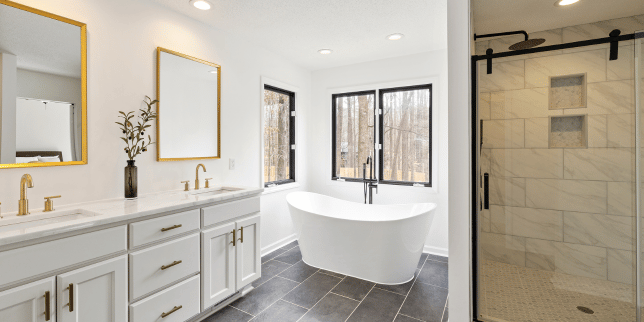
Starting a remodeling project is an exciting venture that needs proper preparation and execution. Part of that journey involves inspection scheduling, ensuring compliance with building codes, safety standards, and quality assurance.
Inspections are difficult, even when done correctly. Without inspection scheduling, your build could be delayed for weeks to months - leaving your remodel in an agonizing state of incompletion and with no access to essential spaces of your home.
This is why it’s imperative to understand what you should expect from your contractor during the inspection process.
Our mission at Custom Built is to design and build the dream spaces of Michigan homeowners and educate you on everything related to home remodeling - something that we have delivered with thousands of successful builds to our clients for over 15 years.
In this article, you will learn more about inspection scheduling, the key factors that affect inspection scheduling, and how your contractor can streamline the process:
What is Inspection Scheduling?
Inspection scheduling is the process of organizing and setting up inspections with the appropriate authorities or inspectors. It ensures that your construction complies with building rules, safety laws, and quality standards. By following inspection schedules, you can keep your project on track and ensure all requirements are met.
Many inspections may be required when starting a remodeling project at various points in the building process. These inspections are usually carried out by certified inspectors who work for the neighborhood building department or other pertinent regulatory organizations. These inspections ensure that the work complies with building codes, follows approved plans, and satisfies safety standards.
1. Permitting Process and Regulations for Inspection Scheduling
Before you can start your renovation project, it's essential to obtain the required permits from your local building department. To achieve this, inspectors evaluate your plans and specifications, then issue the according permits.
The time it takes to get a permit approved can vary based on the complexity of your project, the workload of the building department, and compliance with local regulations. It's crucial to understand this process and factor it into your project timeline, as inspections can only occur once the permits are approved.
Typically, permits take 5-15 business days to be approved, with requested inspections taking 24-48 hours to occur (sometimes up to 10 days if your inspector’s schedule is filled up).
2. Project Scope and Phases that Affect Timing
The length and stages of your remodeling project significantly impact when inspections occur. The number and complexity of reviews needed depend on the project's size and complexity.
For example, a kitchen remodel may require electrical, plumbing, mechanical, and framing inspections (and, in some cases, insulation inspections, depending on the amount of drywall removed from your exterior walls).
Each examination must be completed before moving on to the next phase. Working closely with your contractor helps plan the project efficiently and allows for proper inspection scheduling.
While inspectors are trained to work efficiently, that doesn’t guarantee they won’t find serious issues. Additionally, coordinating all inspectors to evaluate your project around the same time impacts how long it will take to start the inspection.
3. Contractor Availability for Inspections
The availability of your contractor also impacts inspection timing, especially during busy remodeling seasons. Reputable and experienced contractors often have full schedules.
When you hire a design-build firm like Custom Built, inspection requirements and scheduling are handled in-house, alleviating the burden on you. If you choose a general contractor, consult them about inspection requirements and work together to set a timeline for everyone's agenda.
Most evaluations take around 20 minutes, but larger homes may require additional time, given the property's size. By planning inspections early on with your contractor, you can ensure they happen when they should throughout the project.
4. Weather and Seasonal Considerations that Can Hinder Inspections
Outdoor projects like decks, siding, or roofs can be impacted by weather conditions, affecting inspection scheduling. Weather-related delays might be experienced during outside operations and subsequent inspections, such as severe rain or snow.
While organizing your project and setting up inspections, it is essential to consider the potential effects of weather.
5. Inspector Workloads that Interfere with Further Availability
The workload of building inspectors can also impact scheduling inspections. Various inspectors are often tasked with reviewing and approving various projects.
The demand for inspections may outpace the supply of resources during peak times. These seasons include the summer or other drier months when construction isn’t affected by inclement weather. As a result, longer wait times for inspections may arise from this.
6. Code Compliance and Corrections to Ensure Project Integrity
Inspections are carried out to make sure the remodeling work complies with all relevant building laws and safety requirements such as egress window specifications and minimum ceiling heights. Further assessments are required to confirm that the problems have been remedied if an inspection reveals non-compliance or areas needing correction.
These follow-up inspections might affect project timing, come with a reinspection fee, and result in delays. Working closely with your contractor will help you address any compliance issues quickly and effectively, preventing needless obstacles.
7. Communication and Coordination Between Contractors and Inspectors
Effective communication and collaboration among all parties involved in the remodeling project are crucial for successful inspection scheduling. This includes your contractor, the building department, and any project-related subcontractors.
Clear communication streamlines understanding of inspection requirements, timetables, and necessary preparations, making the inspection process smoother. Prompt communication between your remodeler and inspectors ensures that all relevant paperwork and preparations are in place before inspections.
Achieving this level of cohesiveness starts with hiring the right contractor who has experience working with inspectors and follows proper inspection procedures.
8. Unexpected Delays and Changes to Your Project
Even with careful planning, renovation projects can experience unforeseen delays and modifications. Issues like unexpected structural problems or additional work requirements, such as compromised load-bearing walls or hidden pest infestations, can impact inspection timing.
Flexibility and adaptability are key. Close coordination with your contractor and the building department allows for necessary adjustments to the inspection schedule.
It's important to be realistic about structural problems that might significantly delay your project. From damaged foundations to weakened roofing, these issues require dedicated labor and can jeopardize the project's integrity.
Next steps to scheduling an inspection for your remodeling project
Scheduling inspections is critical to remodeling to ensure compliance, safety, and quality. Without it, you could be prone to fines by your local municipality or even put you and your remodeling team in danger with structures that aren't up to code.
By addressing these factors proactively, you can navigate inspection scheduling challenges and bring your remodeling vision to life efficiently and effectively.
As a remodeler with 15+ years of managing and constructing projects, we value creating beautiful and functional spaces and ensuring your construction experience is as positive as possible.
To learn more about how to approach a remodeling project, read the following articles:
Josh Baynes is the Director of Design & Production at Custom Built, overseeing every project from concept to completion while managing estimating and agreement documents to ensure precision and quality. Based in Dewitt, Michigan, he is dedicated to helping homeowners transform their houses into functional, beautiful spaces that enhance daily living.
Topics:


























